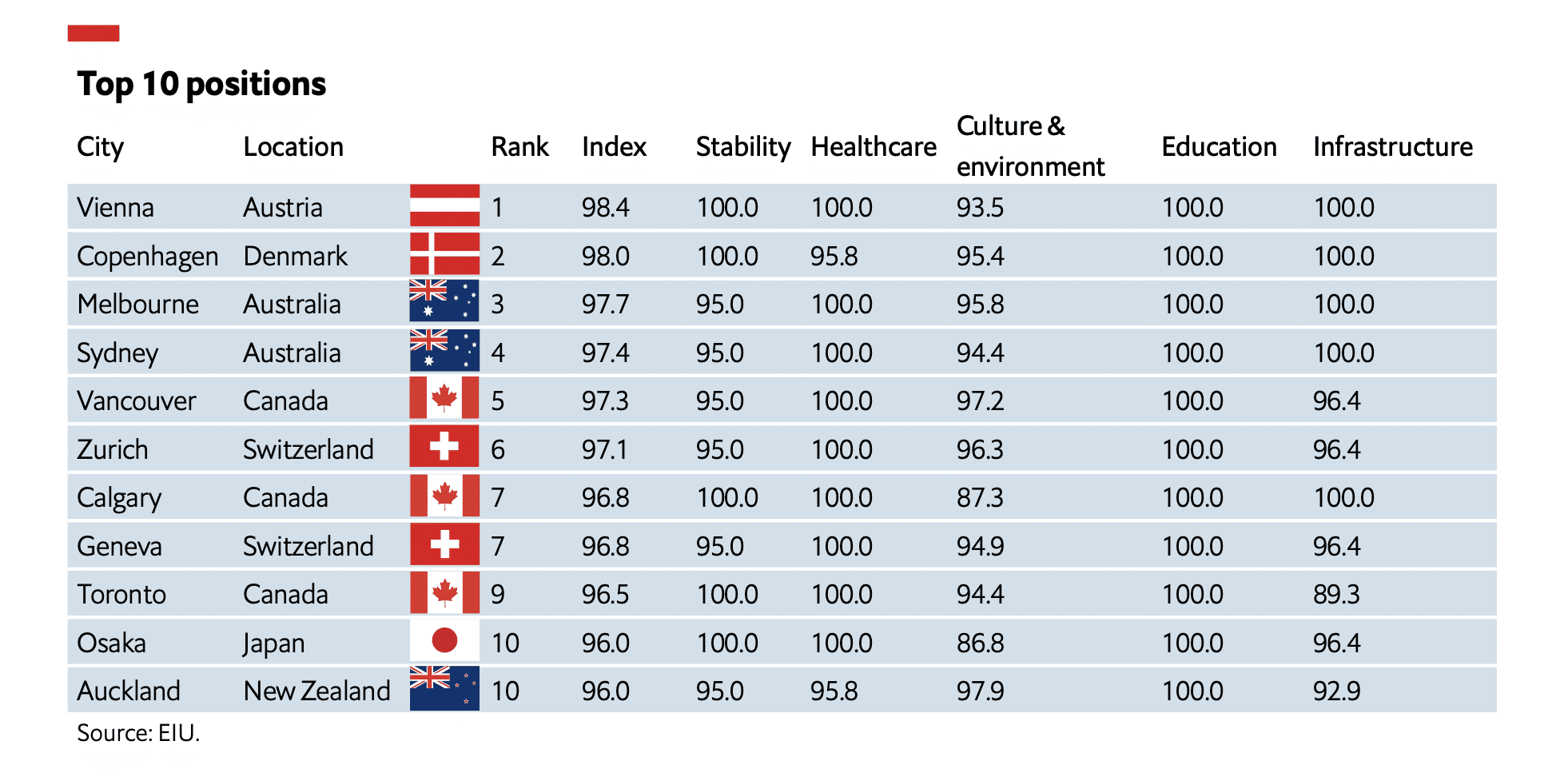Three Canadian cities ranked among the most liveable in the world
The Economist Intelligence Unit (EIU)—a part of the Economist Group—has recently published their Global Liveability Index scores for the year 2023. Among the top 10 most liveable cities were three Canadian ones—with Canada boasting more spots in the top 10 than any other country.
Specifically, these were: Vancouver in fifth place, Calgary in seventh place (tied with Geneva, Switzerland), and Toronto, in ninth place. All these cities scored above a 96 (out of 100) in total liveability according to EIU’s index.
Discover if You Are Eligible for Canadian Immigration
Compared with last year’s rankings, all three cities held their places within the top 10, with some variations. Calgary saw the biggest drop-off, moving from third to eighth place this year. Vancouver retained its number 5 ranking, while Toronto slid one spot, from eighth in 2022 to ninth place in 2023.
Read on to see the full list of the top 10 most liveable cities this year, as well as a breakdown of how EIU reaches their scores.
The top 10 most liveable cities
Vienna took top spot this year, with an overall liveability score of 98.4, with Copenhagen and Melbourne trailing closely behind.
Interestingly the difference in total liveability scores between the 10th and 1st ranked cities was only two points on the liveability score, speaking to how competitive the rankings were. In addition, there are 11 cities in the top 10 ranking due to two ties within for the seventh and tenth spots.

Canada features more prominently in the top 10 than any other country.
Apart from Canada, both Australia and Switzerland featured strongly in the top 10, boasting two cities each. Osaka also placed in the rankings, tying for tenth place with Auckland as the only outside of North America, Europe, and the Australia-New Zealand region to feature on the list.
Vancouver
Holding Canada’s top spot, and number 5 in the world overall, Vancouver performed strongly in this year’s liveability rankings.
The west-coast city scored 97.3 for overall liveability. The breakdown of these scores is telling to where the city’s strengths lie.
Vancouver scored a 100 on the EIU scale in the healthcare (100) and education (100) categories, maintaining a historically high rating in this regard. The city also scored well on culture and environment (97.2), with only slightly diminished performance in the categories of infrastructure (96.4) and stability (95).
Calgary
While not traditionally thought of as one of Canada’s three big cities for newcomers (Toronto, Vancouver, and Montreal), Calgary has continued to perform exceptionally well in liveability rankings, retaining a top 10 spot from 2022’s report with a score of 96.8.
The city boasted perfect scores in stability (100), healthcare (100), education (100) and infrastructure (100), with a comparatively poor performance in culture and environment (87.3) bringing the total liveability score down. According to these results, Calgary continues to show potential to become Canada’s most liveable city, being the only city ranked in the top 10—apart from #1 Vienna—with four perfect 100 scores in different ranking criteria.
Toronto
Canada’s most populous city occupies ninth place this year, with an overall liveability score of 96.5. While this is only 0.3 points away from Calgary’s ranking, the breakdown of scores were vastly different.
Toronto scored perfectly on three ranking criteria: education (100), healthcare (100) and stability (100), with a comparatively much lower performance in infrastructure (89.3). The city also scored a 94.4 in culture and environment. While the city’s lower ranking in the infrastructure section is understandable in the context of Canada’s wider housing woes, the criteria features other aspects that can aid in understanding why Calgary and Vancouver (which is the most expensive city for renters in Canada) were not similarly affected.
How are cities scored according to this research?
As mentioned previously, cities are scored on the following characteristics: stability, healthcare, culture and environment, education, infrastructure. Below are the breakdowns of each criterion:
Stability was further broken down into:
- Prevalence of petty crime;
- Prevalence of violent crime;
- Threat of terror;
- Threat of military conflict; and
- Threat of civil unrest/conflict.
Canadian cities historically score quite highly on stability and safety measures, with both Toronto and Calgary scoring a perfectly, with Vancouver trailing with a 95 rating.
Healthcare measures further broke down into:
- Availability of private healthcare;
- Quality of private healthcare;
- Availability of public healthcare;
- Quality of public healthcare;
- Availability of over-the-counter drugs; and
- General healthcare indicators.
Canada’s generally high-quality of healthcare, and accessibility (even to temporary residents in Canada), along with universally accessible public healthcare for Canadians, means that the country’s cities tend to perform strongly here.
Culture and environment can further be broken down into:
- Humidity and temperature rating;
- Discomfort of climate to travellers;
- Level of corruption;
- Social or religious restrictions;
- Level of censorship;
- Sporting availability;
- Cultural availability;
- Food and drink; and
- Consumer goods and services.
The largest of all the criteria (in terms of factors considered), culture and environment was the only criteria where none of the cities featured in the top 10. Both Toronto and Vancouver scored well (94.4 and 97.2 respectively), while Calgary scored an 87.3—the only criteria for the Albertan city where it did not score a perfect 100.
Education metrics broke down into:
- Availability of private education;
- Quality of private education; and
- Public education indicators.
Education was a strong category, not just in Canada, but worldwide, with every city in the top ten scoring a perfect 100 in this criterion.
Infrastructure indicators can be broken down into:
- Quality of road network;
- Quality of public transport;
- Quality of international links;
- Availability of good quality housing;
- Quality of energy provision;
- Quality of water provision; and
- Quality of telecommunications.
Perhaps the most contentious ranking (due to its inclusion of “availability of good housing”), infrastructure so varying performances among Canada’s top three cities. While Alberta scored exceptionally well (with a perfect 100), and Vancouver ranked strongly with a 96.4 score, Toronto saw the biggest score drop off here, with an 89.3—a key reason why the city slipped to ninth place this year.
- Do you need Canadian immigration assistance? Contact the Contact Cohen Immigration Law firm by completing our form
- Send us your feedback or your non-legal assistance questions by emailing us at media@canadavisa.com







